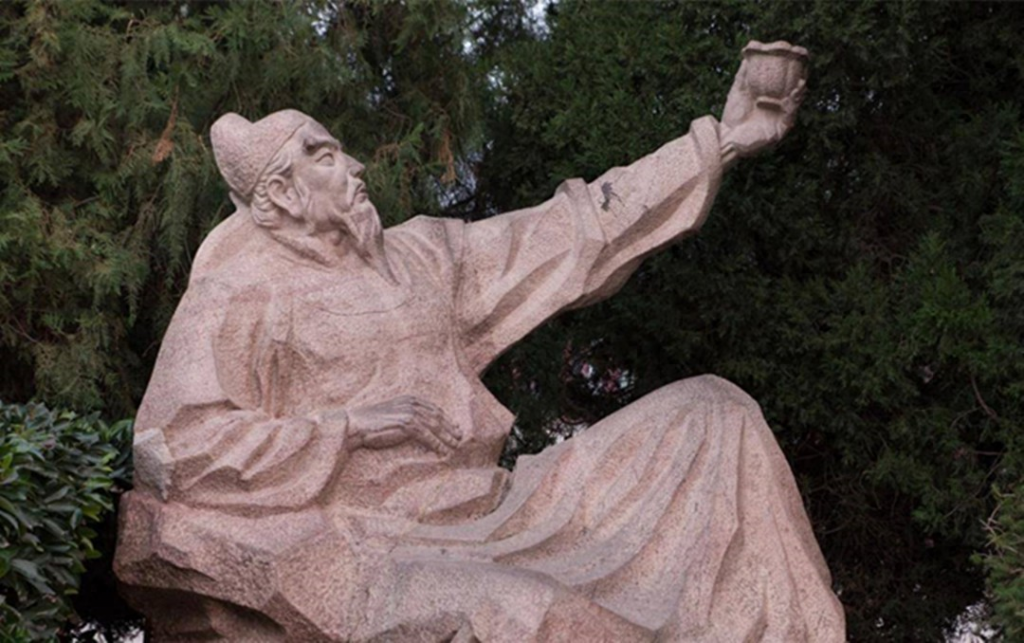Li Bai, the legendary poet of the Tang Dynasty, is often remembered as the man who could compose poems faster than he could drink wine. His line, “Li Bai fights with wine, writes a hundred poems, and sleeps in the tavern of Chang’an”, has immortalized him in the hearts of many. But what if we told you that this immortalized genius, the “god of poetry,” was actually born into luxury, and didn’t live the life of a struggling poet after all? Let’s dive into the surprising details about Li Bai’s wealth and how he became the “king of soft living” in his era.

Li Bai’s Wealthy Beginnings
Contrary to the story of many struggling artists, Li Bai wasn’t a poor, self-made genius from humble beginnings. In fact, his family background could be likened to that of a modern-day heir to a powerful dynasty. According to The New History of the Tang Dynasty, Li Bai’s ancestors were royal descendants from the Sui Dynasty, and his father, Li Ke, was a successful international businessman. He dealt in the high-profit trade along the Silk Road, trading jade for horses—a luxury trade that was highly profitable in those times.
In today’s terms, Li Bai was akin to a Central Asian “Wang Sicong” (the wealthy son of a powerful businessman). It is even rumored that upon reaching adulthood, his father handed him a startup fund of 300,000 taels of silver—an amount that could be worth around 200 million RMB today. Imagine this being reported on Weibo: “Li Ke’s pampered son breaks records”—definitely a trending topic!
Marrying into Power
At 27, Li Bai shocked the intellectual community of his time by marrying into the influential family of Prime Minister Xu Yu’s granddaughter. The Xu family controlled the lucrative salt and iron monopoly in the Yunmengze region of Hubei—basically, they were the “Middle Eastern oil giants” of the Tang Dynasty. In modern terms, this would be like a young poet marrying the daughter of a billionaire tech mogul, instantly becoming a socialite and entering the wealthy elite.
But it doesn’t end there. After his first wife’s untimely death, Li Bai remarried again, this time into the family of Zong Chuke, a high-ranking official during Empress Wu Zetian’s reign. Through these strategic marriages, Li Bai continued to live a life of luxury, traveling the world and creating his poetry. His #LiBaiTheUltimateFreeloader hashtag would have definitely gone viral on social media today!
Monetizing Poetry: The Ancient “Knowledge Payment”
Forget the idea that ancient poets couldn’t make money! Li Bai wasn’t just talented—he knew how to cash in on his gift. One of his biggest fans was Princess Yuzhen, the sister of Emperor Xuanzong. She granted him the “Golden Turtle for Wine” privilege, meaning that he could drink for free at any tavern in Chang’an. This kind of exclusive access would be the equivalent of a VIP card to the most luxurious bars today.
Even more surprisingly, Li Bai received “tips” for his work. According to The Biography of Talented Poets of the Tang Dynasty, Li Bai was rewarded 78 times during his lifetime for his poetic works. The most generous gift was a donation from his friend Wang Lun, who gave him “eight fine horses and ten carts of silk”—a gift worth over 500 million RMB in today’s currency. Now, this is a level of fame that even top influencers today would envy!
Behind the Scenes: The Hidden Income Streams
When Li Bai was appointed to the Hanlin Academy at the age of 42, his official salary was 50 guan per month (about 30,000 RMB). But that wasn’t where the real money was. He earned much more by writing epitaphs for the rich and powerful, earning 200 guan per piece. He even wrote poems for brothels, exchanging each poem for ten days of free feasting!
Notably, while his contemporary Du Fu struggled with poverty, Li Bai thrived because he understood the art of “praise literature.” Take his famous Qing Ping Diao poems, in which he praises the beauty of Yang Guifei; the emperor rewarded him with a luminous pearl from the Western Regions, which was a lavish gift. Li Bai truly knew how to “cash in” on his poetic genius!
Why Li Bai’s Wealth Can’t Be Replicated Today
- Era-Specific Advantages: The Tang Dynasty had a legitimate “tip culture” for intellectuals, which today could be considered bribery.
- Risk Factors: Li Bai’s alignment with Prince Li Lin during a failed rebellion nearly cost him his life—reminding us that even the most gifted individuals could fall prey to the dangers of politics and fame.
- Talent Gap: Li Bai’s poetic genius was a rare gift—something modern writers, no matter how skilled, might struggle to replicate. No modern writer could easily craft a line like “Do you not see the Yellow River coming from the sky”.
Conclusion: Li Bai—A Life of Fortune and Fame
Li Bai’s story is a fascinating example of turning raw talent into wealth, but it’s also a tale of the fleeting nature of fortune. While he lived a carefree, luxurious life filled with travel and creativity, his life was also marked by struggle and eventual tragedy. He died young, caught up in political turmoil, and leaving behind a legacy of both romanticism and hardship.
His life reminds us that “wealth” isn’t just about hard work—sometimes, it’s about having the right connections and the talent to make the most of them. But before you start envying Li Bai’s lifestyle, remember—he spent 30 years wandering, and his life wasn’t as easy as it seems.

No comments yet.